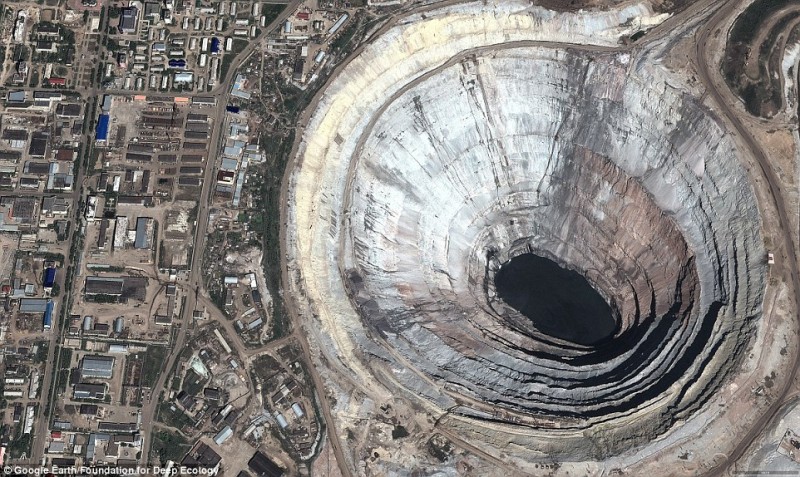Zombie Factories Stalk the Sputtering Chinese Economy
By MICHAEL SCHUMAN
August 28, 2015
Miao Leijie loses money on each ton of cement his company produces. But stopping production is not an option.
When
the plant opened in 2011 to supply the real estate and infrastructure
industries in the northern Chinese city of Changzhi, the company raised
most of the initial money from banks. Now, Mr. Miao, the factory’s
general director, needs to keep churning out cement simply so the
company can pay the interest on its loans.
It
will be tough for the business, Lucheng Zhuoyue Cement Plant, to get
out of the hole. Customers and investments are drying up, and the
company is borrowing even more money to stay afloat.
“If
we ceased production, the losses would be crushing,” Mr. Miao said, as
he chain-smoked in the company’s quiet, spartan office. “We are working
for the bank.”
Changzhi
and its environs are littered with half-dead cement factories and
silent, mothballed plants, an eerie backdrop to the struggling Chinese
economy.
Like many industrial cities across China,
Changzhi, which expanded aggressively during the country’s long
investment boom, has too many factories and too little demand. That
excess capacity, many economists indicate, will have to be eliminated
for the Chinese economy to return to healthy growth.
But rather than shut down, Lucheng Zhuoyue and other Changzhi companies are limping along in a kind of march of the undead.
To
protect jobs and plants, the government and its state-owned banks
sometimes keep money-losing businesses on life support by rolling over
or restructuring loans, providing fresh credit or offering other aid.
While this may seem like an odd business tactic, it is part of a broader
strategy to help maintain social stability, a major goal of China’s
leadership. Authorities in China’s provinces and cities also back
struggling factories just because they are deemed important to the local
economy.
Similar
strategies have been tried before, with little success. In Japan, such
businesses, known as “zombie companies,” are blamed for contributing to
that country’s two decades of economic stagnation.
As
China allows its own “zombies” to stalk the economy, the situation is
clouding the country’s outlook, making it difficult to predict where
growth is headed. If the leadership doesn’t address the underlying
problem, the economic weakness could be prolonged.
Concerns
have already been rising that China’s slowdown is worsening and its
problems are becoming harder to overcome. Such fears helped ignite a dramatic sell-off on stock markets around the world. Shares on the Shanghai stock exchange have tumbled by more than third since the June high.
“Global
investors have now come to realize that China’s travails are beginning
to affect everyone,” said Frederic Neumann, co-head of Asian economic
research at HSBC in Hong Kong.
A Threat to Prosperity
Far
from the sparkle of Shanghai or the export zones of Shenzhen, Changzhi
is a modest city of three million people who live in low-rise apartment
complexes and work in boxy factory compounds. The local economy depends
on steel manufacturing and other heavy industries that girded the
country’s decades-long era of high growth. As the property market grew
and the government plowed money into roads and other infrastructure,
cement factories sprouted on the city’s outskirts to capitalize on the
bonanza, creating hundreds of well-paying jobs. In recent years, the
busy local shops and crammed fast-food restaurants along Changzhi’s
narrow downtown streets bustled with new prosperity.
But
the country’s economy is slowing down, threatening that wealth. Gross
domestic product expanded 7 percent in the second quarter of 2015. While
that would be a stellar performance by the standards of most countries,
it is the slowest pace for China in a quarter-century.
Some
industries are plummeting, wreaking havoc in less economically diverse
cities and towns. Empty apartments built during the boom are now
weighing down the property sector. Businessmen in Changzhi complain that
construction projects supported by the local government have also been
scaled back.
As a result, Changzhi’s cement
plants are saddled by excess capacity. Companies in the province can
produce three times as much cement as what was actually needed in 2014,
according to the Shanxi Provincial Association of Building Material
Industries. Two-thirds of them lost money in that year.
Such
conditions have turned once promising companies into zombies. While
trucks are still parked outside the sprawling industrial compound of
Changzhi’s Huatai Cement Clinker Company, there are far fewer than just a
couple of years ago, and they have less to haul. The money-losing
company has produced a mere 200,000 metric tons of cement this year,
even though it is able to make one million.
As
a state-owned enterprise, Huatai has been kept running with the help of
special assistance. Huatai gets coal on credit and access to cheap
loans from its parent company, which is owned by the provincial
government. That has allowed management to keep all its 300 workers on
the payroll — the company’s top priority. “Our employees need to eat,
they need to live,” said one manager, who declined to give his name.
Such
measures may help sustain employment, but they also delay the much
needed overhaul of Chinese industry. A study of China’s labor market by
the International Monetary Fund released in July noted that state-owned
enterprises tended to keep workers that they did not need. From an
economic perspective, it would be better for such businesses to downsize
or even close, releasing their trained staff to work at companies or in
sectors with stronger prospects. That would shift resources away from
less productive parts of the economy, helping get growth back on track.
Without
such a shift, the economy could suffer in the future. Raphael Lam,
deputy resident representative at the I.M.F. in Beijing, says Chinese
policy makers should move more forcefully to enact pro-market reforms
and allow state-owned enterprises to restructure. If not, he says, “Over
the long term, there would be an increasing likelihood of a sharper
slowdown.”
‘Eternal, Unpaid Vacation’
The
situation is also complicating matters for workers not lucky enough to
keep their jobs. Though unemployment has remained low nationally,
workers in troubled Changzhi complain that good jobs are hard to find.
At
the Changzhi Cement Group, where the only sound is a barking dog, a
former company electrician, Zhao Liwei, 43, watches TV inside a decrepit
room for janitors at the compound’s entrance. Two years ago, as
production at the state-owned plant ground to a halt, her paychecks
stopped coming. Most employees were left to fend for themselves.
Since
the factory was never formally shuttered, they have not received
severance payments or other compensation, Ms. Zhao said. Though a
private company took on a handful of employees to produce cement in a
portion of the plant’s facilities in August, the work is only temporary.
Ms.
Zhao has not worked at all. The only jobs in the area, she says, are
sweeping floors and waiting tables, for as little as 500 renminbi, or
$78, a month. She earned twice that working at the factory. “We were
promised an iron rice bowl” — the Chinese term for lifetime employment —
she said. But now “it is like we’ve been left on an eternal, unpaid
vacation.”
Some of these idled workers have
faced biting hardship. Sitting outside a nearby deteriorating
residential complex, Du Jianping, 45, says that she has to rely on
handouts from her parents to put food on the table for her 12-year-old
daughter. She and her husband lost their jobs at the Changzhi Cement
Group, and ever since, Ms. Du has been earning a pittance selling
women’s clothes and children’s toys at a stall outside a train station.
She
feels trapped, fearing she would be unable to get better work
elsewhere. “We are too old to find jobs in the cities,” she said. “I
hope the government could help lift up the cement industry so that it
can recover.”
Beijing is sensitive to such
pleas. Fearing that joblessness could lead to social instability, the
government has made maintaining employment a primary goal of its
economic policy. Premier Li Keqiang said during a news conference last
year that the lowest growth rate acceptable to the regime “needs to
ensure fairly full employment and realize reasonable increase of
people’s income.”
That helps explain why Beijing is taking stronger action to prop up the economy. On Aug. 25, the central bank cut its benchmark interest rate for the fifth time since November. Almost two weeks earlier, it suddenly devalued the renminbi, which some analysts see as an attempt to lift China’s sagging exports by making them cheaper in international markets.
The
government is also planning to use state banks to finance another round
of infrastructure spending aimed at aiding beleaguered industries like
cement. Managers in Changzhi argue that the authorities should be doing
even more to help, by setting a minimum price for cement or supporting
local construction projects.
Still, such
steps may do little more than keep zombie companies alive — to the
detriment of the overall economy. By pumping up growth with fresh credit
and stimulus, the government might temporarily revive some factories,
but also exacerbate the economy’s problems of excess capacity and high
debt.
The consulting firm IHS Global Insight
estimates that debt relative to China’s output will reach 254 percent in
2015, nearly double the level of 2008. Such debt levels can pose
substantial risks to an economy if borrowers are unable to repay them
and a wave of defaults follows. “The size of debt only accumulates,”
said Grace Wu, a senior director at the rating agency Fitch in Hong
Kong. “That doesn’t help with the underlying economy. It doesn’t help
create jobs.”
Over the long term, Chinese
policy makers are trying to decrease the economy’s dependence on
excessive investment for growth and allow household consumption to play a
bigger role. That means the factories in many heavy industries, like
cement, may never run again at full tilt.
Wang
Xiaohu has not completely given up hope. Over the years, Mr. Wang, a
40-year-old businessman, put 20 million renminbi, or $3.1 million, into
Changzhi Ruili Building Materials Ltd., which can produce 300,000 metric
tons of cement annually. But now the factory site is watched over by a
lone, elderly security guard in an ill-fitting uniform. Mr. Wang was
forced to idle the plant about 18 months ago, laying off nearly all of
his 100 employees.
Mr. Wang, though, has refused
to liquidate the factory. Instead, he maintains the machinery, waiting
for the day when the economy revives and he can produce cement once
again — a day that even he acknowledges may never come. “Many of the
small and medium cement plants here are like this,” Mr. Wang says. “The
chances are slim that they will ever reopen.”










 On the margins …
On the margins … Dangerous signals for the markets?
Dangerous signals for the markets?


 Translate
Translate

























